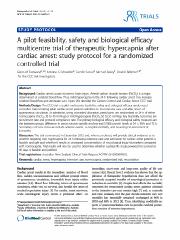Please use this identifier to cite or link to this item:
https://ahro.austin.org.au/austinjspui/handle/1/12739| Title: | A pilot feasibility, safety and biological efficacy multicentre trial of therapeutic hypercapnia after cardiac arrest: study protocol for a randomized controlled trial. | Austin Authors: | Eastwood, Glenn M ;Schneider, Antoine G;Suzuki, Satoshi;Bailey, Michael J;Bellomo, Rinaldo | Institutional Author: | CCC trial investigators | Affiliation: | Department of Intensive Care, Austin Health, Heidelberg, Victoria, Australia Australia New Zealand Intensive Care Society - Research Centre, Monash University, Melbourne, Australia Department of Intensive Care Medicine and Burn Center, Centre Hospitalier Universitaire Vaudois, LaUSAnne, Switzerland Department of Anesthesiology and Resuscitology, Okayama University Hospital, Okayama, Japan |
Issue Date: | 7-Apr-2015 | Publication information: | Trials 2015; 16(): 135 | Abstract: | Cardiac arrest causes ischaemic brain injury. Arterial carbon dioxide tension (PaCO2) is a major determinant of cerebral blood flow. Thus, mild hypercapnia in the 24 h following cardiac arrest may increase cerebral blood flow and attenuate such injury. We describe the Carbon Control and Cardiac Arrest (CCC) trial.The CCC trial is a pilot multicentre feasibility, safety and biological efficacy randomized controlled trial recruiting adult cardiac arrest patients admitted to the intensive care unit after return of spontaneous circulation. At admission, using concealed allocation, participants are randomized to 24 h of either normocapnia (PaCO2 35 to 45 mmHg) or mild hypercapnia (PaCO2 50 to 55 mmHg). Key feasibility outcomes are recruitment rate and protocol compliance rate. The primary biological efficacy and biological safety measures are the between-groups difference in serum neuron-specific enolase and S100b protein levels at 24 h, 48 h and 72 h. Secondary outcome measure include adverse events, in-hospital mortality, and neurological assessment at 6 months.The trial commenced in December 2012 and, when completed, will provide clinical evidence as to whether targeting mild hypercapnia for 24 h following intensive care unit admission for cardiac arrest patients is feasible and safe and whether it results in decreased concentrations of neurological injury biomarkers compared with normocapnia. Trial results will also be used to determine whether a phase IIb study powered for survival at 90 days is feasible and justified.Australian New Zealand Clinical Trials Registry ACTRN12612000690853 . | Gov't Doc #: | 25872502 | URI: | https://ahro.austin.org.au/austinjspui/handle/1/12739 | DOI: | 10.1186/s13063-015-0676-3 | ORCID: | 0000-0002-1650-8939 | Journal: | Trials | URL: | https://pubmed.ncbi.nlm.nih.gov/25872502 | Type: | Journal Article |
| Appears in Collections: | Journal articles |
Files in This Item:
| File | Description | Size | Format | |
|---|---|---|---|---|
| 25872502.pdf | 409.17 kB | Adobe PDF |  View/Open |
Page view(s)
136
checked on Apr 27, 2025
Download(s)
104
checked on Apr 27, 2025
Google ScholarTM
Check
Items in AHRO are protected by copyright, with all rights reserved, unless otherwise indicated.
